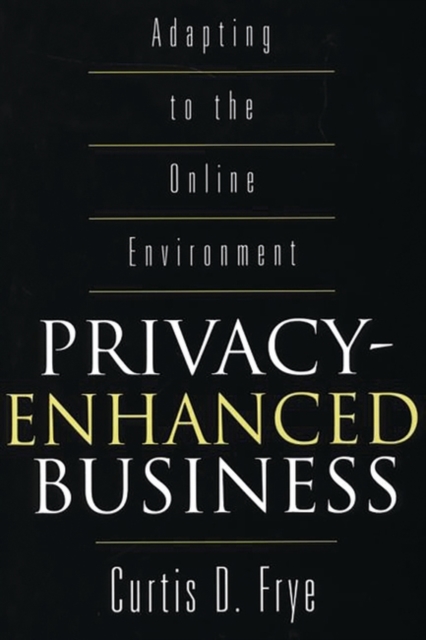
Privacy-Enhanced Business : Adapting to the Online Environment Hardback
by Curtis D. Frye
Hardback
Description
With more than 200 million people online and their numbers on the rise, growing also is a perceived threat to personal privacy.
A trend toward consumer protective legislation is developing in Europe and shows signs of developing in the U.S.
Frye examines the new online environment, the national and international legislative scenarios that could affect the way online business is done, and proposes steps that would allow organizations to determine the policies best for themselves within privacy-enhanced environments.
He lays out the privacy interests and concerns of Internet users in the context of privacy laws in Europe, Canada, and the U.S.
Then, without demonizing or lionizing them, he looks impartially at how corporations could and might have to function under a variety of likely legislations.
Frye's book, among the first to attempt the task, is a timely, much needed advisory—and warning—for top echelon executives in the public and private sectors both, particularly in marketing and sales, areas where privacy activists are concentrating their efforts.
It is also an important source of information and thought for academics and their graduate-level students. Frye introduces the Internet as a social and technological phenomenon by recounting briefly the early days of its predecessor, ARPANet.
In the next chapters he fills in the policy background from a legal standpoint, explaining the thrust toward privacy that emerged through Supreme Court and lower court decisions.
He then examines Internet economics, and from there turns to Internet-based advertising.
He also covers the controversy over cookies and shows what Web users can do to visit Web sites without leaving crumbs.
He introduces the infomediary, a type of organization that could allow consumers to maintain anonymity while still granting businesses access to detailed demographic and behavioral information.
Frye describes a range of scenarios that could be played out over the next decade and offers specific steps that organizations can take to improve consumer confidence, maintain the flow of information they need, yet still demonstrate their compliance with consumer expectations as well as the law.
Two appendices contain the full text of two documents vital to senior managers mapping their own corporate strategies: the European Union Data Directive and an EU Work Paper on the use of contracts to ensure the security of personally identifiable information that is transferred from the EU to other countries, such as the U.S., that lack their own adequate protections.
Information
-
Out of stock
- Format:Hardback
- Pages:264 pages
- Publisher:Bloomsbury Publishing Plc
- Publication Date:30/12/2000
- Category:
- ISBN:9781567203219
Information
-
Out of stock
- Format:Hardback
- Pages:264 pages
- Publisher:Bloomsbury Publishing Plc
- Publication Date:30/12/2000
- Category:
- ISBN:9781567203219






